Related Research Articles
Talian, or Brazilian Venetian, is a dialect of the Venetian language, spoken primarily in the Serra Gaúcha region in the northeast of the state of Rio Grande do Sul in Brazil. It is also spoken in other parts of Rio Grande do Sul, as well as in parts of Espirito Santo and of Santa Catarina.
Abortion in Brazil is a crime, with penalties of 1 to 3 years of imprisonment for the pregnant woman, and 1 to 4 years of imprisonment for the doctor or any other person who performs the abortion on someone else. In three specific situations in Brazil, induced abortion is not punishable by law: in cases of risk to woman's life; when the pregnancy is the result of rape; and if the fetus is anencephalic. In these cases, the Brazilian government provides the abortion procedure free of charge through the Sistema Único de Saúde. This does not mean that the law regards abortion in these cases as a right, but only that women who receive abortions under these circumstances, and the doctors, will not be punished. The punishment for a woman who performs an abortion on herself or consents to an abortion performed by another outside these legal exceptions is one to three years of detention. The base penalty for a third party that performs an illegal abortion with the consent of the patient, ranges from one to four years of detention, with the possibility of increase by a third if the woman comes to any physical harm, and can be doubled if she dies. Criminal penalties fixed at four years or less can be converted to non-incarceration punishments, such as community service and compulsory donation to charity.
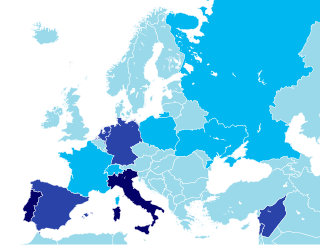
Immigration to Brazil is the movement to Brazil of foreign peoples to reside permanently. It should not be confused with the forcible bringing of people from Africa as slaves. Latin Europe accounted for four-fifths of the arrivals. This engendered a strikingly multicultural society. Yet over a few generations, Brazil absorbed these new populations in a manner that resembles the experience of the rest of the New World.
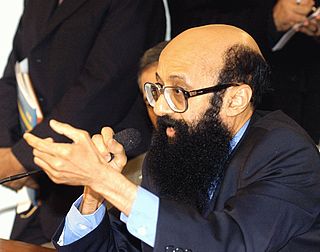
Enéas Ferreira Carneiro was a Brazilian polymath, cardiologist, physicist, mathematician, professor, writer, military serviceman and politician. He represented the state of São Paulo in the National Chamber of Deputies and ran for presidency three times. He was founder and leader of the nationalist and conservative Party of the Reconstruction of the National Order (PRONA), which was usually seen as being far-right.
Same-sex marriage has been legal in Brazil since 16 May 2013 in accordance with a decision from the National Justice Council, ordering notaries of every state to license and perform same-sex marriages. Brazil became the second country in South America to legalize same-sex marriage nationwide, after Argentina, and the twelfth worldwide to do so.
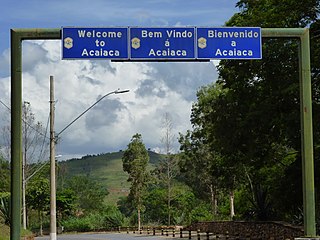
Portuguese is the official and national language of Brazil being widely spoken by most of the population. Brazil is the most populous Portuguese-speaking country in the world, with its lands comprising the majority of Portugal's former colonial holdings in the Americas.
Jogo do bicho is an illegal gambling game in Brazil, prohibited by federal law since 1946, but nevertheless very popular throughout the country. It is a lottery-type drawing, operated on a regional basis using the daily state lottery draw, by criminals known as bicheiros, banqueiros ("bankers"), or contraventores. Despite its popularity, especially in Rio de Janeiro, it is illegal in 25 of the 26 states of Brazil plus the Federal District and those involved may be prosecuted. Paraíba is the only state where the game is legal and regulated by the state, even though federal law prohibits gambling. Unlike most state-operated lotteries, in jogo do bicho any amount can be wagered.

The Attorney General Office is a cabinet-level position in the Brazilian government charged with advising the Executive Branch and representing the federal government of Brazil in legal proceedings legally known as the Union (União). The Attorney General is defined under the Article 131 of the Brazilian Constitution as one of the essential functions of Brazilian judicial administration, along with the roles performed by the judicial branch, the Prosecutor's office, the public defenders and private lawyers. The current Attorney General is Jorge Messias.

The president of the Federal Senate, sometimes referred to as the President of the Senate, is the presiding officer of the Federal Senate of Brazil.
Antônio Petrus Kalil, known as Turcão, was one of the operators of the jogo do bicho, a popular illegal lottery in Brazil. Kalil ran the game in a number of towns, including Niteroi, and was one of 14 bicheiros or banqueiros—"bankers" as the game's operators are known—who were sentenced to six years' imprisonment in May 1993 for operating a criminal association. Kalil's brother Jose, known as "Zinho", was among those convicted. Denise Frossard, the judge in the case, wrote in 2007 that it was the first time the existence of a mafia-type organization had been recognized in Brazil. According to Frossard, Kalil was one of the organization's bosses in 1981. In April 2007, he was among 24 people charged for involvement with the illegal lottery, as well as bingo parlours and the distribution of slot machines. On March 13, 2012, he was sentenced to 48 years in prison and a fine of BRL 11 million for conspiracy and corruption, together with the other bicho bosses Anísio Abraão David and Capitão Guimarães.
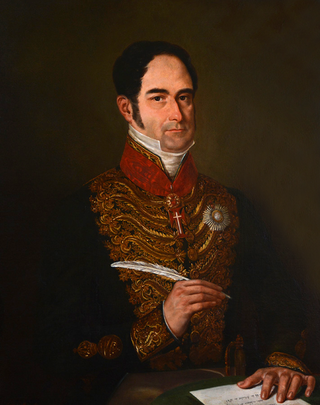
Manuel Alves Branco, the 2nd Viscount of Caravelas was a Brazilian politician, economist, and magistrate during the Empire of Brazil (1822–1889). He held the positions of general deputy, minister of justice, minister of finance, senator and was also the first de jure prime-minister of Brazil.

General elections were held in Brazil on 5 October 2014 to elect the president, the National Congress, and state governorships. As no candidate in the presidential election received more than 50% of the vote in the first round on 5 October 2014, a second-round runoff was held on 26 October 2014.

Corruption in Brazil exists on all levels of society from the top echelons of political power to the smallest municipalities. Operation Car Wash showed central government members using the prerogatives of their public office for rent-seeking activities, ranging from political support to siphoning funds from state-owned corporation for personal gain. The Mensalão scandal for example used taxpayer funds to pay monthly allowances to members of congress from other political parties in return for their support and votes in congress. Politicians also used the state-owned and state-run oil company Petrobras to raise hundreds of millions of reais for political campaigns and personal enrichment.

Events in the year 1967 in Brazil.

The 2017 labor reform in Brazil was a significant change in the country's Consolidation of Labor Laws. According to the government, the goal of the reform was to combat unemployment and the still ongoing 2014 Brazilian economic crisis.

Onyx Dornelles Lorenzoni is a Brazilian politician, businessman, and veterinarian. A member of the Liberal Party (PL), he served as a federal deputy from Rio Grande do Sul for five terms. After the 2018 Brazilian general election, the president-elect Jair Bolsonaro invited Lorenzoni to be his Chief of Staff. He was also designated leader of the transition team.
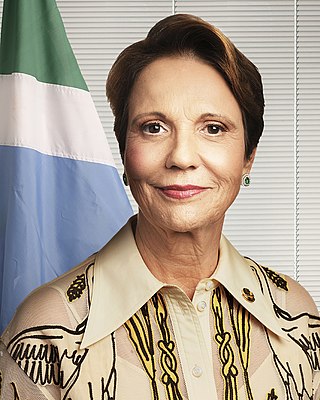
Tereza Cristina Corrêa da Costa Dias is a Brazilian entrepreneur, agronomic engineer, and politician, member of the Progressistas (PP). She has been a Federal Deputy since 2015, representing the state of Mato Grosso do Sul, and is a member of the congressional ruralist front. In November 2018, Jair Bolsonaro, as president-elect, announced that she would be Minister of Agriculture, Livestock and Supply and the first woman to compose the new government, which was inaugurated on 1 January 2019. She was appointed by a group of 20 members of the Farming Parliamentary Front (FPA). In the 2022 elections, Cristina was elected Senator for the state of Mato Grosso do Sul, having resigned from the Cabinet of Jair Bolsonaro.

Eduardo Gabriel Aquino Cossa, commonly known as Pepê, is a Brazilian professional footballer who plays for Primeira Liga club Porto and the Brazil national team. Mainly a winger, he can also play as a right-back.

Events in the year 2019 in Brazil.
Auxílio Brasil was the social welfare program of the Government of Brazil, created during the presidency of Jair Bolsonaro. Announced in October 2021, the provisional measure was sanctioned by Bolsonaro after passing through both legislative houses on 30 December 2021, replacing Bolsa Família. However, after Lula's reelection as president of Brazil in 2022, he declared that he would rename the program to Bolsa Família, putting an end to Auxílio Brasil.
References
- ↑ Máximo, João (2 March 2012). "A incrível história do homem que ganhou o Cassino da Urca no jogo". O Globo (in Brazilian Portuguese). Retrieved 13 November 2021.
- ↑ Belém, Euler de França. "FBI espionou mulher de presidente brasileiro". Jornal Opção (in Brazilian Portuguese). Archived from the original on 12 October 2011. Retrieved 13 November 2021.
- ↑ José, Magno (1 September 2021). "Especial: 'A complexa trajetória da regulação do jogo no Brasil'". BNLData (in Brazilian Portuguese). Retrieved 13 November 2021.
- ↑ Magri, Diogo (25 September 2021). "Casas de aposta esportiva tomam o Brasil, mas movimentam seus bilhões de reais fora do país". El País Brasil (in Brazilian Portuguese). Retrieved 13 November 2021.
- ↑ "Decreto-Lei nº 204, de 27 de fevereiro de 1967" (in Brazilian Portuguese). Chamber of Deputies of Brazil . Retrieved 13 November 2021.
- ↑ "Lei nº 8.672, de 6 de julho de 1993" (in Brazilian Portuguese). Chamber of Deputies of Brazil. Retrieved 13 November 2021.
- ↑ "Lei nº 9.615, de 24 de março de 1998" (in Brazilian Portuguese). Chamber of Deputies of Brazil. Retrieved 13 November 2021.
- ↑ "Medida Provisória nº 168, de 20 de fevereiro de 2004" (in Brazilian Portuguese). Chamber of Deputies of Brazil. Retrieved 13 November 2021.
- ↑ Tanji, Thiago (11 July 2017). "Tudo o que você precisa saber sobre jogos de azar no Brasil". Galileu (in Brazilian Portuguese). Retrieved 13 November 2021.
- ↑ "Crise econômica na pandemia reacende debate sobre legalização de jogos no país". Senado Notícias (in Brazilian Portuguese). Federal Senate of Brazil. 5 November 2020. Retrieved 13 November 2021.